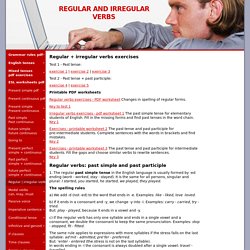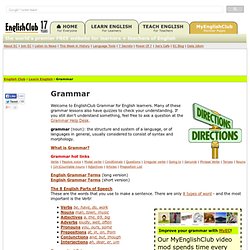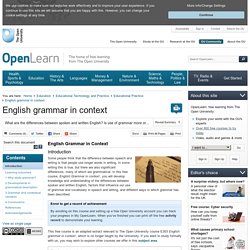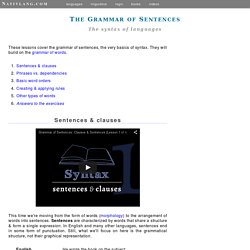

Parts-of-speech. Regular + Irregular verbs. Regular + irregular verbs exercises Regular verbs: past simple and past participle 1.

The regular past simple tense in the English language is usually formed by -ed ending (work - worked, stay - stayed). It is the same for all persons, singular and plural: I started, you started, he started, we played, they played. The spelling rules a) We add -d (not -ed) to the word that ends in -e. B) If it ends in a consonant and -y, we change -y into -i. C) If the regular verb has only one syllable and ends in a single vowel and a consonant, we double the consonant to keep the same pronunciation. The same rule applies to expressions with more syllables if the stress falls on the last syllable: ad'mit - admitted, pre'fer - preferred.But: 'enter - entered (the stress is not on the last syllable). 2. Regular verbs list (pdf) As you see below, there are a lot of cases in the English language when you must change the spelling if you add the -ed ending: Regular forms with different spelling Our tips top.
Grammar. Welcome to EnglishClub Grammar for English learners.

Many of these grammar lessons also have quizzes to check your understanding. If you still don't understand something, feel free to ask a question at the Grammar Help Desk. grammar (noun): the structure and system of a language, or of languages in general, usually considered to consist of syntax and morphology. What is Grammar? Grammar hot links Verbs | Passive voice | Modal verbs | Conditionals | Questions | Irregular verbs | Going to | Gerunds | Phrasal Verbs | Tenses | Nouns | (Un)Countable nouns | Adjectives | Articles | Preposition List English Grammar Terms (long version) English Grammar Terms (short version) The 8 English Parts of Speech These are the words that you use to make a sentence. Improve your grammar with MyEC! Our MyEnglishClub video mod spends time every day tagging videos that can help you with grammar.
Grammatical Category Including number, case, gender, tense, aspect etc.
Module1 Activity Grammar. Module1 Handout Grammar. English Grammar in Context - OpenLearn - Open University - E303_1. Some people think that the difference between speech and writing is that people use longer words in writing.

In some writing this is true, but there are also significant differences, many of which are grammatical. In this free course, English Grammar in context, you will develop knowledge and understanding of the differences between spoken and written English, factors that influence our use of grammar and vocabulary in speech and writing, and different ways in which grammar has been described. Enrol to get a record of achievement By enrolling on this course and setting up a free Open University account you can track your progress in My OpenLearn.
When you’ve finished you can print off the free activity record to demonstrate your learning. This free course is an adapted extract relevant to The Open University course E303 English grammar in context, which is no longer taught by the University. 28. Just, yet, still, already. Present Perfect Continuous. BEG Teacher’s Guide. Grammar of Sentences - an introduction to syntax. (Linguistics lessons for language learners) Sentences & clauses This time we're moving from the form of words (morphology) to the arrangement of words into sentences.

Sentences are characterized by words that share a structure & form a single expression. In English and many other languages, sentences end in some form of punctuation. Still, what we'll focus on here is the grammatical structure, not their graphical representation. I’ll use the terms "grammar" and "grammatical" in these lessons, but they’re different than how you may have heard them used in the past. A simple way to conceive of grammar at this point is to treat it as a set of rules that allows you either to accurately describe or produce sentences in a specific language. Grammatically, a sentence contains at least one clause. The main verb in a clause is typically a finite verb, which means that the verb reflects something about the subject, the doer of the action.
Types of clauses Clauses come in a variety of shapes and sizes. Practice Exercise a) There's a lot here. Year1_Menu6_SupportingGrammar.pdf. Repository.excellencegateway.org.